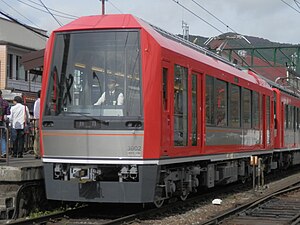The Hakone Tozan 3000 series (箱根登山鉄道3000形) is a single-car electric multiple unit (EMU) train type operated by the Japanese private railway operator Hakone Tozan Railway on its steeply graded Hakone Tozan Line since 1 November 2014.[3]
| Hakone Tozan 3000 series | |
|---|---|
 Car 3002 at Gora Station, 2 November 2014 | |
| Manufacturer | Kawasaki Heavy Industries[1] |
| Designer | Noriaki Okabe |
| Built at | Kobe, Hyogo |
| Constructed | 2014, 2019 |
| Entered service | 1 November 2014 |
| Number built | 4 vehicles |
| Formation | Single car |
| Fleet numbers | 3001–3004 |
| Capacity | 75 (36 seated) |
| Operators | Hakone Tozan Railway |
| Lines served | Hakone Tozan Line |
| Specifications | |
| Car body construction | Stainless steel |
| Car length | 14,660 mm (48 ft 1 in) |
| Width | 2,568 mm (8 ft 5.1 in) |
| Height | 3,966 mm (13 ft 0.1 in) |
| Doors | 2 per side |
| Maximum speed | 55 km/h (35 mph)[2] |
| Weight | 35.6 t[2] |
| Traction system | TDK6060-A 3-phase squirrel-cage induction motors |
| Power output | 50 kW x 4 |
| Acceleration | 4.0 km/(h⋅s) (2.5 mph/s) |
| Deceleration | 4.0 km/(h⋅s) (2.5 mph/s) (service) 4.5 km/(h⋅s) (2.8 mph/s) (emergency) |
| Electric system(s) | 750/1,500 V DC overhead line |
| Current collector(s) | PT7169-A single-arm pantograph |
| Bogies | TS-330B |
| Braking system(s) | Track brake[1] |
| Multiple working | 2000 series, 3100 series |
| Track gauge | 1,435 mm (4 ft 8+1⁄2 in) |
Overview
editThe fleet consists of two single-car units branded "Allegra". The general design of the trains was overseen by Noriaki Okabe Architecture Network, with the two vehicles on order costing a total of approximately 800 million yen.[4][3]
Externally, the trains are finished in the standard Hakone Tozan Railway livery of "Vermillion Hakone" with silver highlights.[3]
-
The side view of car 3001 in February 2015
Interior
editPassenger accommodation consists mostly of four-person seating bays, with a wheelchair space at the Gora end of the cars.[4] Seating is provided for 36 passengers, including five pairs of tip-up seats near the doorways.[3] Total capacity is 75, including standing passengers.[3] The trains use LED lighting throughout.[3]
-
Interior view
-
A 4-person facing seating bay
-
Forward-facing priority seating
-
Flip-up seating
-
Perch seating
History
editThe first unit was delivered from Kawasaki Heavy Industries in Kobe in April 2014,[5] with the second unit delivered in August.[6]
In May 2015, the 3000 series was awarded the 2015 Laurel Prize, presented annually by the Japan Railfan Club.[7] A presentation ceremony was held at Gora Station on 8 November 2015.[8]
Two new units, 3003 and 3004, were delivered in May 2019.[9]
References
edit- ^ a b 箱根登山鉄道 3000形第1号車が完成 [First Hakone Tozan Railway 3000 series car completed]. Tetsudō Daiya Jōhō Magazine (in Japanese). Vol. 43, no. 362. Japan: Kōtsū Shimbun. June 2014. p. 69.
- ^ a b 箱根登山鉄道3000形 [Hakone Tozan Railway 3000 series]. Japan Railfan Magazine (in Japanese). Vol. 54, no. 643. Japan: Koyusha Co., Ltd. November 2014. pp. 78–83.
- ^ a b c d e f 箱根登山鉄道3000形 [Hakone Tozan 3000 series]. Japan Railfan Magazine (in Japanese). Vol. 54, no. 639. Japan: Koyusha Co., Ltd. July 2014. pp. 92–94.
- ^ a b 箱根登山電車 新型車両デザイン決定! [Design of new Hakone Tozan Railway trains finalized] (PDF). News Release (in Japanese). Japan: Odakyu Electric Railway. 5 June 2013. Archived (PDF) from the original on 23 September 2020. Retrieved 7 June 2013.
- ^ 箱根登山電車新型車両3000形車両搬入作業完了! [New Hakone Tozan Railway 3000 series delivered] (PDF). News release (in Japanese). Japan: Hakone Tozan Railway. 14 April 2014. Retrieved 14 April 2014.[permanent dead link]
- ^ 3000形3002号が甲種輸送される [3000 series set 3002 delivered]. Tetsudo Hobidas (in Japanese). Japan: Neko Publishing. 22 August 2014. Archived from the original on 4 August 2020. Retrieved 23 August 2014.
- ^ ブルーリボン賞・ローレル賞 選定車両一覧 [Blue Ribbon Award & Laurel Prize Winner List] (in Japanese). Japan: Japan Railfan Club. 21 May 2015. Archived from the original on 23 January 2016. Retrieved 21 May 2015.
- ^ 箱根登山鉄道「ローレル賞」授賞記念式典を開催 [Hakone Tozan Railway holds Laurel Prize award ceremony]. Tetsudō Daiya Jōhō Magazine (in Japanese). Vol. 45, no. 381. Japan: Kōtsū Shimbun. 2016. p. 72.
- ^ 箱根登山鉄道3000形が甲種輸送される [Hakone Tozan Railway 3000 series cars transported]. Japan Railfan Magazine Online (in Japanese). Japan: Koyusha Co., Ltd. 18 May 2019. Archived from the original on 4 July 2022. Retrieved 4 July 2022.
External links
edit- Official website (in Japanese)